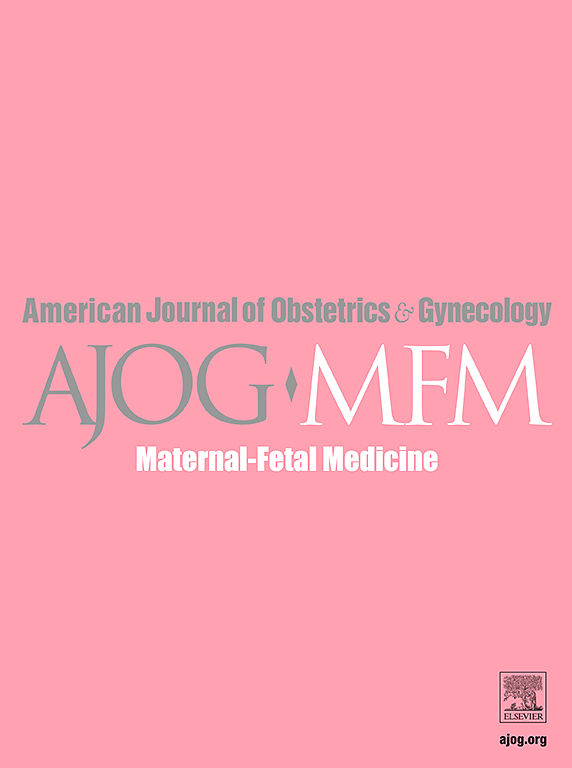怀孕期间的睡眠:种族和民族差异及其与歧视经历的关联的系统回顾。
IF 3.1
2区 医学
Q1 OBSTETRICS & GYNECOLOGY
American Journal of Obstetrics & Gynecology Mfm
Pub Date : 2025-05-14
DOI:10.1016/j.ajogmf.2025.101688
引用次数: 0
摘要
目的:睡眠对围产期健康至关重要,孕期睡眠质量差和睡眠时间短与孕产妇不良结局(如早产、先兆子痫、抑郁症)以及后代不良结局(如出生体重低、神经发育障碍风险)的风险增加有关。然而,越来越多的工作记录了族裔和种族睡眠健康差异的存在,但没有审查怀孕期间的差异,这一时期睡眠对孕妇和后代的健康至关重要,并且在怀孕和分娩结果方面也观察到明显的差异。我们回顾了关于产前睡眠健康的种族/民族差异的现有证据,以及暴露于种族/民族歧视与产前睡眠之间的关系,这是差异的潜在机制。数据来源:PubMed, MEDLINE, EMBASE, PsycINFO, CINAHL和ClinicalTrials.gov从成立到2023年11月3日。研究资格标准:同行评议的定量研究,检查1)睡眠中的种族/民族差异和/或2)产前暴露于种族/民族歧视之间的关系。研究评价和综合方法:本系统综述进行了叙述性综合,并使用了国家心脏、肺和血液研究所的观察队列和横断面研究质量评估工具。结果:纳入了18项研究:12项发现了差异,3项没有,3项记录了歧视经历与睡眠之间的联系。总的来说,与白人相比,非裔美国人/黑人孕妇的睡眠时间更短,睡眠质量更差。在检查睡眠障碍、潜伏期和失眠症状时,研究得出了不同的结果。西班牙裔/拉丁裔人群的研究结果喜忧参半,一些研究发现,短睡眠时间和长睡眠时间的风险都有所增加,睡眠中断的情况也有所增加和减少。对其他种族/族裔群体的研究太少,无法得出结论。经历种族/民族歧视和较差的产前睡眠之间的联系在调查该主题的三项研究中都有记录,但两项研究的样本重叠,因此无法得出结论。结论:研究表明产前睡眠存在民族/种族差异,强调需要有针对性的干预和支持。然而,重要的差距仍然存在,包括对社会经济地位和母亲年龄、健康状况和抑郁症等协变量的考虑不足。然而,控制社会经济地位的研究记录了差异,表明当考虑到教育程度和收入等因素时,差异仍然存在。测量睡眠的方法有很大的差异,导致了研究结果的异质性。我们的综述强烈强调需要进行更多的研究,并强调解决健康的社会决定因素和实现睡眠健康公平的重要性,这对维持健康妊娠至关重要。本文章由计算机程序翻译,如有差异,请以英文原文为准。
Sleep during pregnancy: a systematic review of racial and ethnic disparities and associations to experiences of discrimination
OBJECTIVE
Sleep is critical for perinatal health with poor quality and short sleep duration in pregnancy being associated with adverse maternal outcomes (eg, preterm birth, preeclampsia, depression) and an increased risk for poor offspring outcomes (eg, lower birth weight, risk for neurodevelopmental disorders). However, a growing body of work documents the existence of ethnic and racial sleep health disparities, but no reviews have examined these disparities during pregnancy, a period when sleep is critical for the health of the pregnant person and offspring and when stark disparities in pregnancy and delivery outcomes are also observed. We reviewed the available evidence regarding racial/ethnic disparities in prenatal sleep health and the association between exposure to racial/ethnic discrimination and prenatal sleep, a potential mechanism that underlie the disparities.
DATA SOURCES
PubMed, MEDLINE, Embase, PsycINFO, CINAHL, and ClinicalTrials.gov were searched from inception to November 3, 2023.
STUDY ELIGIBILITY CRITERIA
Peer-reviewed quantitative studies that examined (1) racial/ethnic disparities in sleep and/or (2) associations with exposure to racial/ethnic discrimination in the prenatal period.
STUDY APPRAISAL AND SYNTHESIS METHODS
In this systematic review, a narrative synthesis was conducted using the National Heart, Lung, and Blood Institute Quality Assessment tool for Observational Cohort and Cross-sectional Studies.
RESULTS
A total of 18 studies were included; 12 found disparities, 3 did not, and 3 documented associations between experiences of discrimination and sleep. Overall, African American/Black pregnant persons were found to experience shorter sleep durations and poorer sleep quality than White persons. Studies yielded mixed findings when sleep disturbances, latency, and insomnia symptoms were examined. Findings were mixed for Hispanic/Latine persons with some studies finding increased risk for short and long sleep duration and both increased and decreased sleep disruptions. Studies of other racial/ethnic groups were too few to draw conclusions. Associations between experiencing racial/ethnic discrimination and poorer prenatal sleep were documented across the 3 studies that examined the topic, but 2 studies had overlapping samples, precluding any conclusions.
CONCLUSION
Studies suggest the presence of ethnic/racial disparities in prenatal sleep, emphasizing the need for targeted interventions and support. However, important gaps remain, including poor consideration of covariates like socioeconomic status and maternal age, health conditions, and depression. However, studies that controlled for socioeconomic status documented disparities, suggesting that disparities persist when factors like educational attainment and income are considered. There was considerable variety in how sleep was measured, contributing to the heterogeneity in the findings. Our review strongly underscores the need for more research and highlights the importance of addressing social determinants of health and achieving sleep health equity, which is critical to sustaining healthy pregnancies.
求助全文
通过发布文献求助,成功后即可免费获取论文全文。
去求助
来源期刊

American Journal of Obstetrics & Gynecology Mfm
Medicine-Medicine (all)
CiteScore
7.40
自引率
3.20%
发文量
254
审稿时长
40 days
期刊介绍:
The American Journal of Obstetrics and Gynecology (AJOG) is a highly esteemed publication with two companion titles. One of these is the American Journal of Obstetrics and Gynecology Maternal-Fetal Medicine (AJOG MFM), which is dedicated to the latest research in the field of maternal-fetal medicine, specifically concerning high-risk pregnancies. The journal encompasses a wide range of topics, including:
Maternal Complications: It addresses significant studies that have the potential to change clinical practice regarding complications faced by pregnant women.
Fetal Complications: The journal covers prenatal diagnosis, ultrasound, and genetic issues related to the fetus, providing insights into the management and care of fetal health.
Prenatal Care: It discusses the best practices in prenatal care to ensure the health and well-being of both the mother and the unborn child.
Intrapartum Care: It provides guidance on the care provided during the childbirth process, which is critical for the safety of both mother and baby.
Postpartum Issues: The journal also tackles issues that arise after childbirth, focusing on the postpartum period and its implications for maternal health. AJOG MFM serves as a reliable forum for peer-reviewed research, with a preference for randomized trials and meta-analyses. The goal is to equip researchers and clinicians with the most current information and evidence-based strategies to effectively manage high-risk pregnancies and to provide the best possible care for mothers and their unborn children.
 求助内容:
求助内容: 应助结果提醒方式:
应助结果提醒方式:


